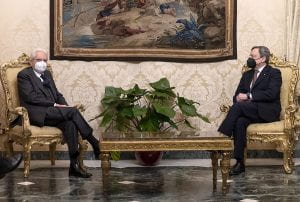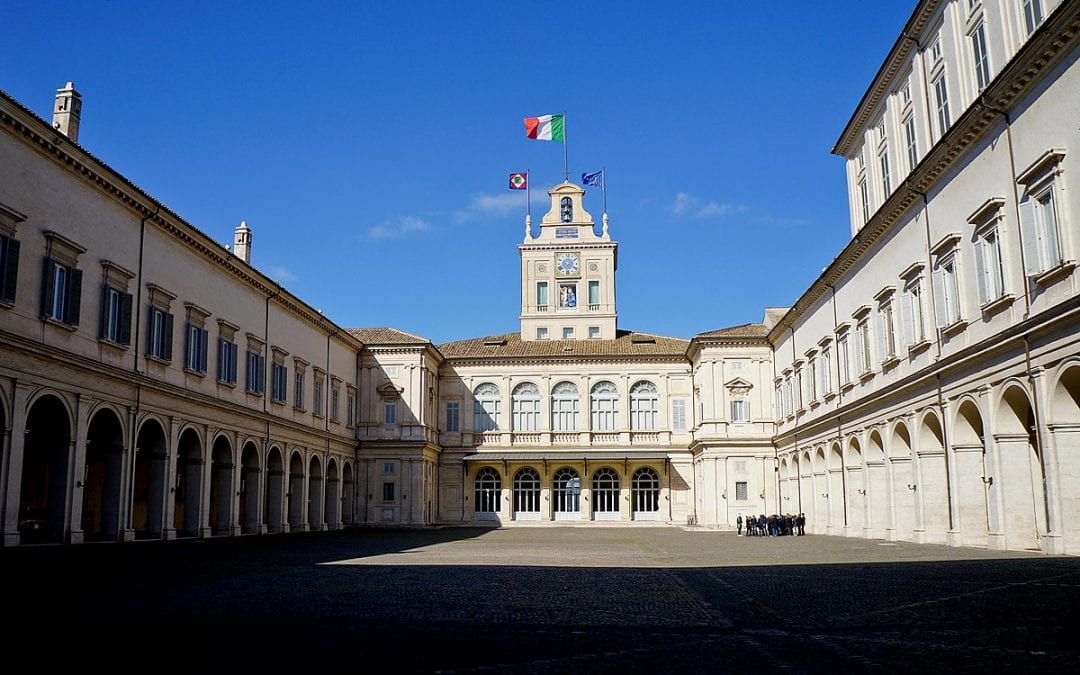Per the Constitution, the Italian President must be an Italian citizen over the age of fifty elected by members of Parliament for a seven year term. The office is primarily ceremonial, but the President of Italy is important domestically. The President represents national unity, approves the coalition of the Parliament that the Prime Minister is a member of (like the Queen does for the House of Commons in the UK), and receives diplomats. This role does not hold the power that the Prime Minister—the Head of Government—holds. However, the President can veto pieces of constitutional reform, acting as a final counterbalance for protecting the constitution. The President can also appoint a Prime Minister when no government can be formed by parliament. While the septennial election is typically only followed in Italy, the most recent Italian presidential elections were closely followed by politicians, journalists, and lawyers around the world. The driving force behind this new interest on the global stage was in large part due to Mario Draghi.
Mario Draghi, the current Prime Minister of Italy and former President and Board member of the European Central Bank, is an anomalous presence in Italian electoral politics. After failed coalition negotiations regarding COVID-19 emergency funds, former Prime Minister Giueseppe Conte resigned, thereby precipitating the dissolution of his government. Draghi was called upon by President Mattarella to form a unity government. Entering the office of the Prime Minister following extreme economic and social hardship due to the pandemic, as well as the fiercely partisan political climate, was not an easy task. Draghi was selected in order to usher some much needed stability in this rather unstable Italy. As a technocrat, economist, and EU insider, Draghi was able to present neutrality, fiscal responsibility, and unity to a fatigued Italian public. After having a central role in managing the Eurozone and inflation crises of the 2010’s as the director of the European Central Bank, Draghi was not new to dealing with complex and unpopular policies and general political instability. His technocratic background and lack of partisanship was refreshing to a divided Italy. However, the stability he cultivated began to unravel at the end of President Sergio Mattarella’s term.
As the presidential election approached, members of the legislative branch began discussing potential candidates. Mattarella stated his lack of interest in stepping forward for re-election. The octogenarian with decades of public service was looking forward to retirement. Prime Minister Draghi, the pillar of stability in historically unstable Italy, became the front runner for the position. Despite his national popularity, his candidacy was deemed unideal by many within the government of Italy. If elected, Draghi’s unity government would be dissolved without its prime minister. Another cycle of instability, polarization, and Italian euro-skeptic tension with the EU would begin. The now high-stakes presidential election process began with the eyes of Europe and the world following closely.
The anachronistic and tedious election is conducted via secret ballot by elected representatives. The voters go into booths with velvet curtains and place their ballots in large wicker baskets. The votes are counted on the floor of parliament and if a candidate does not receive two thirds of the total ballots, a new vote must be cast. As some say, “things tend to get serious at the fourth ballot.” The 2022 election had multiple stalemates, abstentions, and was a slow and extensive process.

President Mattarella (left) and Prime Minister Draghi (right)
While reluctant to resume his post after expecting to retire, Mattarella entered as a candidate after the seventh round of voting when it became clear that unity was not going to come easy. The typically insular and esoteric presidential election process was followed closely globally, and Mattarella’s willingness to be re-elected ended a rather tense and nervous period for the European Union. After eight rounds of voting, Sergio Mattarella was re-elected as President of Italy on January 29th, 2022.
The European Union has been faced with many challenges as of late, such as Member State compliance with rule of law mechanisms, economic instability due to the COVID-19 pandemic, and migration disputes. The stewardship of Draghi has established Italy as crucial to European financial recovery from COVID-19, and his fiscal expertise will assist Italy in efficient usage of COVID recovery bonds given to EU member states, called NextGenerationEU.
The convoluted Italian presidential election process has routinely been an internal affair. However, with so much for the EU on the line, the election garnered intense global interest. With the election of Mattarella, unity and stability in Italy under Draghi has been renewed, until the next election.
Author Biography: Keegan James is a Moderator of the International Law Society’s International Law and Policy Brief (ILPB) and a J.D. candidate concentrating in International and Comparative Law at The George Washington University Law School. He has a Bachelor’s Degree in Political Science from Kenyon College and is an Italian-American.

